イベント&アクティビティ
Workshop and public symposium on ‘Mediated Social Touch’
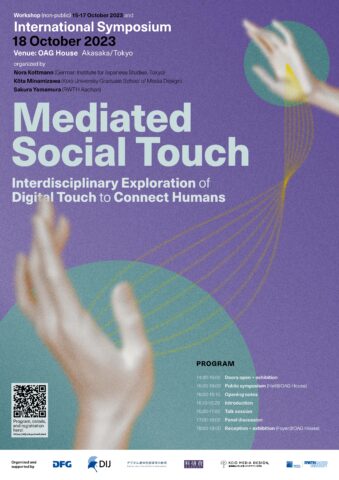 What is the future role of mediated social touch for social inclusion and societal participation in the context of the increasing digitalisation and diversification of Japanese and German societies? The workshop and symposium Mediated Social Touch. Interdisciplinary Explorations of Digital Touch to Connect Humans will bring together experts and practitioners from social sciences, neuroscience, haptics and computer science/AI to gain a comprehensive and multi-perspective understanding of mediated social touch and its potential for connecting humans in a digitalized world. The public symposium on 18 October at the OAG Hall in Tokyo is preceded by a three-day internal workshop. The project is funded by the German Research Foundation (DFG) and the Japanese Society for the Promotion of Science (JSPS). Details and registration here
What is the future role of mediated social touch for social inclusion and societal participation in the context of the increasing digitalisation and diversification of Japanese and German societies? The workshop and symposium Mediated Social Touch. Interdisciplinary Explorations of Digital Touch to Connect Humans will bring together experts and practitioners from social sciences, neuroscience, haptics and computer science/AI to gain a comprehensive and multi-perspective understanding of mediated social touch and its potential for connecting humans in a digitalized world. The public symposium on 18 October at the OAG Hall in Tokyo is preceded by a three-day internal workshop. The project is funded by the German Research Foundation (DFG) and the Japanese Society for the Promotion of Science (JSPS). Details and registration here
Hybrid DIJ Forum on Germany’s New Security Policy and Japan’s Take

In February 2022, Germany’s Chancellor Olaf Scholz proclaimed a Zeitenwende (“epochal shift”) denoting a shift away from close economic ties with Russia and announcing a massive investment in Germany’s defense capabilities. These measures were meant to meet the economic and political challenges faced by a country that had previously relied on pacifist politics. Drawing on a historical perspective of Germany’s “long remilitarization” from the Korean War to the Armed Forces’ missions in Afghanistan and Mali, this talk will evaluate what the Zeitenwende means for Germany’s present and future with a particular focus on security policy. Professor Tokuchi will comment on Professor Leggewie’s presentation providing a Japanese view on the changing global security landscape. After the presentations, the discussion will be opened to the floor. The event will be followed by a networking reception. Details and registration here
Claus Leggewie, Giessen University
Hideshi Tokuchi, Research Institute for Peace and Security
Hybrid DIJ Study Group session on Spatial Dynamics in Japanese Poetry

The COVID-19 pandemic has had a profound impact on our understanding of space. However, the world of reading, an activity traditionally seen as a purely cognitive act that allows readers to leave their physical bodies behind, appeared to remain relatively unaffected by these spatial constraints. This interdisciplinary presentation will closely examine poetic works like Saihate Tahi’s site-specific installation Shi no kasoku / shi no teishi (2020), Fuzuki Yumi’s sound installation Koe no genba (2021), and the online exhibition Kakuri-shiki nōkōsesshoku-shitsu (2020) by Mizusawa Nao and media artist Fuse Rintarō to explore space, proximity, and the act of reading within the context of poetry installations. The presentation will suggest that their works create poetic spaces that serve as a poignant reminder of the readers‘ own physicality. As a result, readers become more aware to the spaces that surround them and the far-reaching effects of COVID-19 on these settings. Details and registration here
Sarah Pützer, University of Oxford/DIJ Tokyo
Celia Spoden to discuss avatar robots in schools in Germany
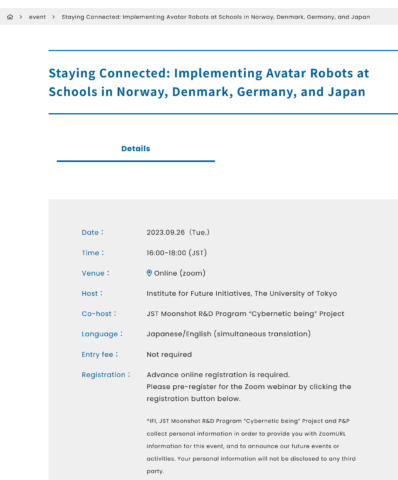
Avatar robots designed for children unable to attend school due to injury, illness, or disability have been increasingly adopted in Europe and Japan in recent years. The online event Staying Connected: Implementing Avatar Robots at Schools in Norway, Denmark, Germany, and Japan will show cases of avatar robots being introduced into educational environments in European countries and Japan, accompanied by discussions about their challenges and potential opportunities. It features presentations by Arisa Ema (University of Tokyo), Sofie Sejer Skoubo (Aarhus University), Marit Haldar, Maja Nordtug (both Oslo Metropolitan University), and DIJ’s Celia Spoden. The event is hosted by the University of Tokyo’s Institute for Future Initiatives (IFI) and takes place on Tuesday, 26 September 2023. Details and registration here
Workshop on discursive and material dimensions of the digital transformation
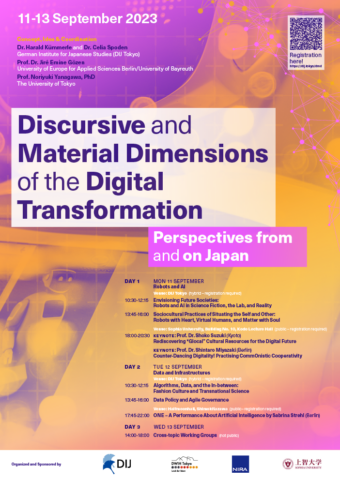 Based on perspectives from and on Japan, this workshop brings together 20 scholars to discuss connecting approaches and analytical concepts in digital transformation. Discursive and material dimensions of the digital transformation: Perspectives from and on Japan will explore visions, practices, and narratives in politics, research and development, and science fiction related to robots, artificial intelligence, and algorithms (day 1); the use of data and the development of data infrastructures with regard to their socio-cultural, economic, and historical situation (day 2). On the final day, the results of the previous days are compiled and related from a transdisciplinary perspective to think about possibilities of employing them productively. The workshop will draw on approaches from media and cultural studies, anthropology, the history of science, and science and technology studies. It takes place 11-13 September online, at Sophia University (keynotes), and in Shimokitazawa. Details and registration here
Based on perspectives from and on Japan, this workshop brings together 20 scholars to discuss connecting approaches and analytical concepts in digital transformation. Discursive and material dimensions of the digital transformation: Perspectives from and on Japan will explore visions, practices, and narratives in politics, research and development, and science fiction related to robots, artificial intelligence, and algorithms (day 1); the use of data and the development of data infrastructures with regard to their socio-cultural, economic, and historical situation (day 2). On the final day, the results of the previous days are compiled and related from a transdisciplinary perspective to think about possibilities of employing them productively. The workshop will draw on approaches from media and cultural studies, anthropology, the history of science, and science and technology studies. It takes place 11-13 September online, at Sophia University (keynotes), and in Shimokitazawa. Details and registration here
DIJ Study Group session on ‘The Sublime and Wabi-Sabi’
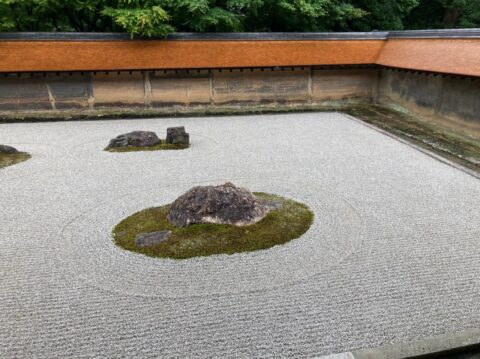
One of the most noteworthy examples of the Japanese art form known as karesansui (枯山水), i. e. dry landscape garden, can be found at the Ryōan-ji in Kyoto. Philippe Bürgin proposes that the aesthetic appeal of this garden’s composition can be fruitfully recontextualized in accordance with the aesthetic category of the Kantian sublime, in the sense that its abstract moments point towards a void, an idea, something that goes beyond our perception – but still within our perception. The aesthetic moments of the sublime coincide with Japanese aesthetic categories such as wabi-sabi by marking the spatial and temporal thresholds of what is representable. The presentation argues that there is a latent sublimity to Japanese art works in which even modern forms of artistic expression might have been anticipated. Details and registration here
Philippe Bürgin, State University of Fine Arts Stuttgart/DIJ Tokyo
Hybrid DIJ Study Group on Patronage and “Confucian Diplomacy”
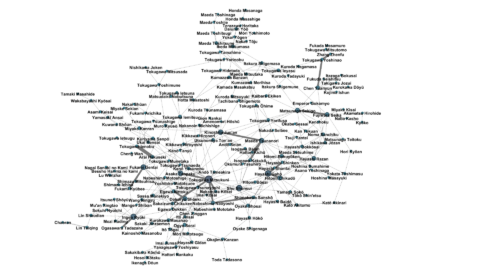
The 17th century holds historical significance as the formative period of Japan’s early modern scholarship. Heavily influenced by Confucian learning traditions, this era’s academic structures and intellectual patterns paved the way for Japan’s modernisation in the 19th century. This presentation aims to shed light on two new perspectives regarding the reign of Maeda Tsunanori (1643-1724), the fourth ruler of Kaga domain. Firstly, it will examine the standing of primarily Confucian scholars within the Kaga domain, their affiliation with Tsunanori, and his initiatives to support them. Secondly, the role of knowledge and scholarship in Tsunanori’s position within the political system will be investigated, along with the extent to which his education and his academic endeavours shaped his interactions with other rulers and prominent figures. This presentation also seeks to explore whether Tsunanori engaged in what might be termed “Confucian diplomacy”. Details and registration here
Michael Dietrich, Martin-Luther-University Halle-Wittenberg/DIJ Tokyo
Online DIJ Study Group on Growth-oriented Carbon Pricing Concept
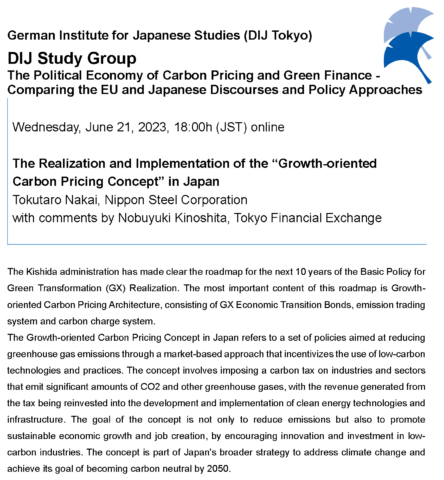
The Growth-oriented Carbon Pricing Concept in Japan refers to a set of policies aimed at reducing greenhouse gas emissions through a market-based approach that incentivizes the use of low-carbon technologies and practices. It is the most important part of the Basic Policy for Green Transformation (GX) Realization, as outlined by the Kishida administration, and consists of GX Economic Transition Bonds, emission trading system and carbon charge system. Its goal is to reduce emissions and to promote sustainable economic growth and job creation, by encouraging innovation and investment in low-carbon industries. The concept is part of Japan’s broader strategy to address climate change and achieve its goal of becoming carbon neutral by 2050. This session of the DIJ Study Group on ‘The Political Economy of Carbon Pricing and Green Finance – Comparing the EU and Japanese Discourses and Policy Approaches’ takes place online. Details and registration here
Tokutaro Nakai, former Vice Minister, Ministry of the Environment, Japan, Executive Advisor to Nippon Steel Corporation
with comments by Nobuyuki Kinoshita, Tokyo Financial Exchange

















 Open Access
Open Access
